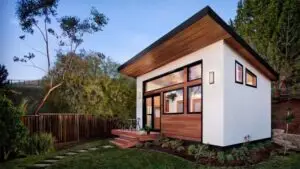What is an ADU and Why It’s Gaining Popularity in Massachusetts
Massachusetts is grappling with a severe housing shortage. With home prices and rents skyrocketing, it’s becoming increasingly difficult for many people to find affordable places to live. To tackle this challenge, the state is encouraging the development of Accessory Dwelling Units (ADUs) as part of the solution.
What is an ADU?
An Accessory Dwelling Unit (ADU) is a small, secondary home built on the same lot as a main house. These units can take different forms, like a converted garage, a finished basement, or even a standalone tiny house in the backyard. Typically ranging from 300 to 1,200 square feet, ADUs are designed as fully functional living spaces, complete with a kitchen, bathroom, and sleeping area.
Why Are ADUs Becoming Popular in Massachusetts?
A recent law has made it easier for Massachusetts homeowners to build ADUs. This change is part of a broader effort to expand affordable housing options and address the ongoing housing crisis.
Here’s why ADUs are gaining traction:
-
Adding More Housing: ADUs are a fast and efficient way to create new housing without the need for large-scale construction projects.
-
Affordable Living: Homeowners can rent out ADUs for extra income or use them to house family members. For renters, ADUs are often a more affordable alternative to traditional apartments.
-
Flexibility: ADUs serve many purposes—they can house aging parents (known as “granny flats”), provide living space for adult children, or even double as a home office or guest suite.
-
Eco-Friendly: Building an ADU is often more sustainable than constructing a new home. ADUs make better use of existing land and resources, reducing their environmental footprint.
-
Simpler Rules: The new law has loosened zoning restrictions and streamlined the approval process. Previously, many areas had zoning rules that made it nearly impossible for homeowners to build ADUs.
What Does the New Law Do?
The Massachusetts law supporting ADUs is designed to make the process more accessible for homeowners. Key changes include:
- Relaxed Zoning Rules: Requirements for lot sizes and other restrictions have been eased.
- Simplified Permitting: Homeowners can navigate the approval process more easily and quickly.
- Encouragement for Local Adoption: Cities and towns are incentivized to update their zoning codes to align with the new law and support ADU construction.
The goal is to ensure that ADUs aren’t just an option for wealthy homeowners but something more people can take advantage of.
The Future of ADUs in Massachusetts
As Massachusetts works to tackle its housing crisis, ADUs are becoming a key part of the solution. Many cities and towns are revising their local rules to support the state’s push for more flexible housing options.
Of course, challenges remain. Financing an ADU can be difficult, and some neighborhoods are resistant to change. But the growing interest in ADUs signals a shift toward more creative and sustainable housing solutions.
Why ADUs Matter
Accessory Dwelling Units are a practical, innovative way to expand housing options in Massachusetts. By making better use of existing properties, they offer affordable, flexible solutions for both homeowners and renters. Whether you’re thinking about adding an ADU to your property or searching for an affordable place to live, ADUs are a trend worth watching—they just might be a big part of the answer to the state’s housing crisis.






